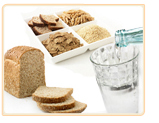Menopause diet
Before discussing commone diets for menopause that women often use in order to ease the many menopause symptoms that exist, it is first necessary to quantify what precisely menopause is. Menopause is a stage of life that women pass through from around the age of 40 and beyond. The stages of menopause include:
 . Peri-menopause
. Peri-menopause
. Menopause
. Post menopause
Women can experience these stages at differing times but they are categorized by a women's hormone receptors losing the ability continue producing the various hormones that the body needs. Hormones such as estrogen are fundamental to a women's reproductive system and her general health and well being. When such hormones begin to drop below sufficient levels it can result in a plethora of menopause symptoms which can include: depression, vaginal dryness, hair loss, loss of libido and after many years in post menopause, osteoporosis. Whilst many women seek invasive treatments in order to curb the harsher effects of such symptoms various menopause diets can also help.
What is a menopause diet?
What are some of the menopause symptoms?
In addition to the menopause symptoms already mentioned others include: hot flashes, night sweats, insomnia, incontinence and changes in body odor. A menopause diet can help in the treatment of some of these symptoms.
There are many pills, supplements and surgeries such as hormone replacement therapy which can help women to treat the sometimes dangerous effect of their menopause symptoms. But many doctors favor simpler methods of helping women in this regard. To this end, following a menopause diet is sometimes prescribed as an easier and quicker way to soothing the discomfort involved with menopause symptoms.
What basic steps are involved in order to successfully follow a menopause diet?
Many doctors would advise a well balanced menopause diet in order to curb some of the effects of some of the 34 menopause symptoms that exist. Of key importance is a balance of all the food groups, particularly grains, protein, dairy products, protein alternatives and carbohydrates. Part of such a balanced menopause diet is not overdoing some of these food groups, caution should be particularly advised with: fats, proteins and carbohydrates.
What symptom specific menopause diets exist?
In addition to maintaining a general healthy food balance, specific menopause diets exist that are better for treating specific problems. These include:
Hot Flashes and night sweats: Tea, coffee, alcohol, spicy food and fizzy drinks have all been known to trigger instances of hot flashes or nights and a reduction of these can help with this symptom. Drinking at  least 8 glasses water a day can also help.
least 8 glasses water a day can also help.
Mood swings: This menopause symptom can be curbed by raising the serotonin level in women's bodies. Foods that are rich in carbohydrates are capable of achieving this desired effect. Foods such as: grain breads, cereals and bagels have been known to help.
What alternatives do women consider? A menopause diet is a good natural method of treating some of the different menopause symptoms. If such symptoms persist however women may consider alternative treatments such as hormone replacement therapy or phytoestrogenic or non-estrogenic herbs. To see the alternative methods of treatment please continue here.



























